New Products
-
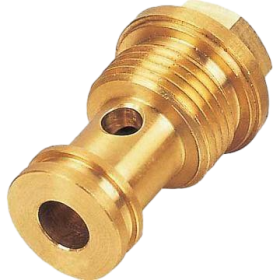
Custom Turn-Mill Combination brass parts
-
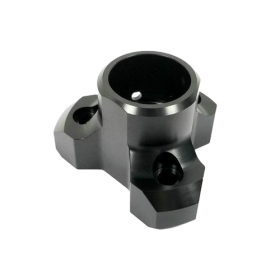
Custom Turn-Mill Combination parts
-
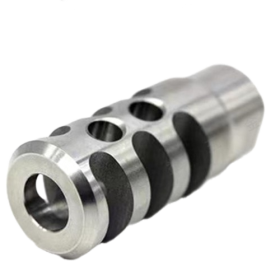
Precision CNC Turning Parts Stainless Steel shaft accessories
-
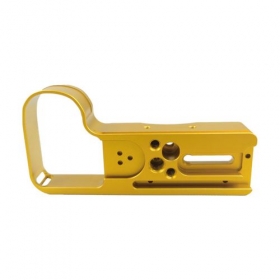
Precision CNC Custom Made Colorful Anodized Aluminum milling parts
-
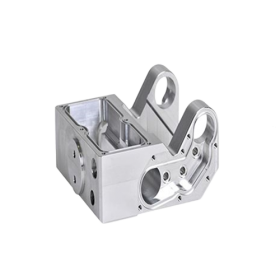
Custom CNC Milling Automated Machinery and Equipment Parts
-
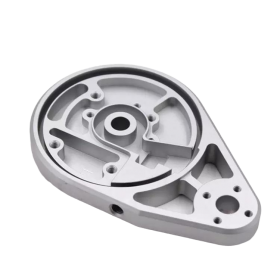
OEM/ODM Custom High Precision Metal CNC Machining/Milling/Turning Service CNC Turning Part
A Comprehensive Guide To Aluminum 7075 CNC Parts
In the world of precision manufacturing, CNC (Computer Numerical Control) machining has revolutionized the production of high - quality parts. When it comes to materials, aluminum 7075 is a popular choice due to its excellent mechanical properties. Hard anodizing, a specialized surface treatment, further enhances the performance of aluminum 7075 CNC parts.
Hard anodizing is a valuable surface treatment for aluminum 7075 CNC parts. It enhances the performance, durability, and corrosion resistance of these parts, making them suitable for a wide range of applications across various industries. Whether it's in aerospace, automotive, sports, or marine sectors, hard - anodized aluminum 7075 is a reliable choice for high - quality and long - lasting components.
This article will delve into the details of aluminum 7075, its surface treatments, the significance of hard anodizing, and its applications across various industries.
Aluminum 7075
Aluminum 7075 is the strongest of accessible aluminum alloys, making it an ideal choice for applications where both strength and low weight are crucial. Composed primarily of aluminum, with significant amounts of zinc, magnesium, and copper, this alloy offers excellent fatigue resistance, good machinability, and high toughness. Its chemical composition typically includes about 5.1 - 6.1% zinc, 2.1 - 2.9% magnesium, 1.2 - 2.0% copper, and small amounts of other elements like chromium.
Aluminum 7075 is a high - strength aluminum alloy with the following specific mechanical properties:
· High strength: It has excellent tensile strength, typically reaching around 572 - 621 MPa in the T6 temper (heat - treated and artificially aged). This makes it suitable for applications where high strength - to - weight ratio is crucial, such as in the aerospace industry.
· Good hardness: The alloy has a relatively high hardness, which provides resistance to wear and deformation. In the T6 temper, its hardness can be around 150 - 160 HB (Brinell hardness).
· High fatigue strength: Aluminum 7075 exhibits good fatigue resistance, meaning it can withstand repeated loading and unloading cycles without failure. This is important for components that are subject to cyclic stresses, like aircraft structural parts.
· Good toughness: It has reasonable toughness, allowing it to absorb energy before fracturing. This property makes it more resistant to sudden impacts and cracks compared to some other alloys.
· Low density: With a density of about 2.81 g/cm³, it is much lighter than many other metals with similar strength, such as steel. This low density, combined with its high strength, gives it an excellent strength - to - weight ratio, making it an ideal material for applications where weight reduction is a priority.
Surface Treatments for Aluminum 7075
Anodizing
· Regular Anodizing: This is a common surface treatment for aluminum 7075. It forms a thin, protective oxide layer on the surface of the alloy. Regular anodizing can improve the corrosion resistance of the part and also provides a base for dyeing, allowing for a variety of colors. However, the oxide layer is relatively thin, usually in the range of 5 - 25 micrometers.
· Hard Anodizing: As a more advanced form of anodizing, hard anodizing creates a much thicker and harder oxide layer on the aluminum 7075 surface. The thickness of the hard - anodized layer can range from 25 to 150 micrometers. This process is carried out under specific conditions, such as lower temperatures and higher current densities compared to regular anodizing.
Powder Coating
Powder coating involves applying a dry powder to the surface of the aluminum 7075 part. The powder is electrostatically charged and then cured under heat, forming a durable and protective coating. It offers a wide range of colors and finishes, and can provide good corrosion and abrasion resistance. However, it may not be as suitable for applications where high - precision dimensions are required, as the coating can add a small amount of thickness to the part.
Chromate Conversion Coating
Chromate conversion coating is a chemical treatment that forms a thin, protective layer on the aluminum surface. It is often used as a primer for subsequent painting or as a standalone corrosion - protection method. While it provides good corrosion resistance, it contains hexavalent chromium, which is a toxic and environmentally harmful substance. Therefore, there is a growing trend towards using more environmentally friendly alternatives.
Hard Anodized Compared To Normal Anodized Aluminum 7075
Coating Thickness
As mentioned earlier, the most obvious difference is the thickness of the oxide layer. Normal anodizing produces a relatively thin layer, while hard anodizing results in a much thicker and denser coating. This thicker layer provides better protection against wear, abrasion, and corrosion.
Hardness
Hard - anodized aluminum 7075 has a significantly higher hardness compared to normally anodized parts. The hard - anodized layer can reach a hardness of up to 500 - 600 HV (Vickers Hardness), which makes it highly resistant to scratches and wear. In contrast, the hardness of a normally anodized layer is much lower.
Corrosion Resistance
Hard anodizing offers superior corrosion resistance. The thick oxide layer acts as a more effective barrier against moisture, chemicals, and other corrosive agents. This makes hard - anodized aluminum 7075 parts suitable for use in harsh environments, such as marine or industrial settings.
Appearance
Normal anodizing allows for easier coloring and can achieve a more aesthetically pleasing finish with a wider range of colors. Hard - anodized parts, on the other hand, are more difficult to color uniformly, and the natural color of a hard - anodized surface is usually a dull gray or black.
Industry of Application
Aerospace Industry
Aluminum 7075, especially when hard anodized, is widely used in the aerospace industry. Its high strength - to - weight ratio and excellent corrosion resistance make it suitable for components such as aircraft wings, fuselage frames, and landing gear parts. The hard - anodized surface provides additional protection against the harsh environmental conditions encountered during flight, including high - altitude exposure and exposure to various chemicals.
Automotive Industry
In the automotive sector, hard - anodized aluminum 7075 CNC parts are used in performance - oriented applications. For example, they can be found in engine components, suspension parts, and high - performance brake systems. The high strength and wear resistance of hard - anodized 7075 help improve the durability and performance of these parts.
Sports Equipment
Hard - anodized aluminum 7075 is also used in the production of sports equipment. Bicycle frames, golf club heads, and climbing gear are some examples. The combination of strength, light weight, and corrosion resistance makes it an ideal material for sports equipment that needs to withstand rigorous use and various environmental conditions.
Marine Industry
Due to its excellent corrosion resistance, hard - anodized aluminum 7075 is used in the marine industry. It can be found in boat fittings, engine components, and other parts that are exposed to saltwater and other corrosive elements. The hard - anodized surface helps protect these parts from corrosion, extending their lifespan.
Importance of Hard Anodizing for Aluminum 7075 CNC Parts
Enhanced Durability
Hard anodizing significantly increases the durability of aluminum 7075 CNC parts. The thick and hard oxide layer protects the underlying alloy from wear, abrasion, and corrosion, reducing the need for frequent replacements. This is especially important in industries where parts are subject to heavy use and harsh conditions.
Improved Performance
In applications where precision and performance are critical, such as aerospace and automotive industries, hard - anodized aluminum 7075 parts can offer better performance. The high hardness and smooth surface finish of the hard - anodized layer can reduce friction, improve the efficiency of moving parts, and enhance the overall performance of the equipment.
Cost - Effectiveness in the Long Run
Although the initial cost of hard anodizing may be higher compared to some other surface treatments, the long - term cost savings are significant. The increased durability and reduced maintenance requirements of hard - anodized parts mean lower replacement costs and less downtime for equipment.
Conclusion
Bomei produces custom Aluminum 7075 parts with our in-house aluminum alloy CNC Machining Services, we operate as a one-stop CNC shop offering rapid quotes, manufacturer-direct pricing, total quality control and fast delivery times on all custom parts.
If you’re in search of a reliable partner for your aluminum CNC machining and milling needs, look no further than Bomei. Contact us today, and let us turn your ideas into reality.
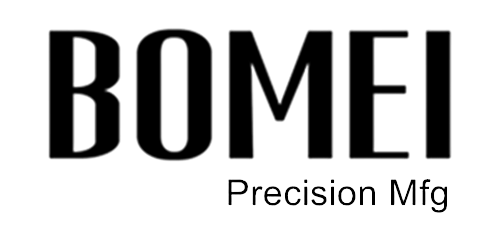
 Evan Xiao
Evan Xiao